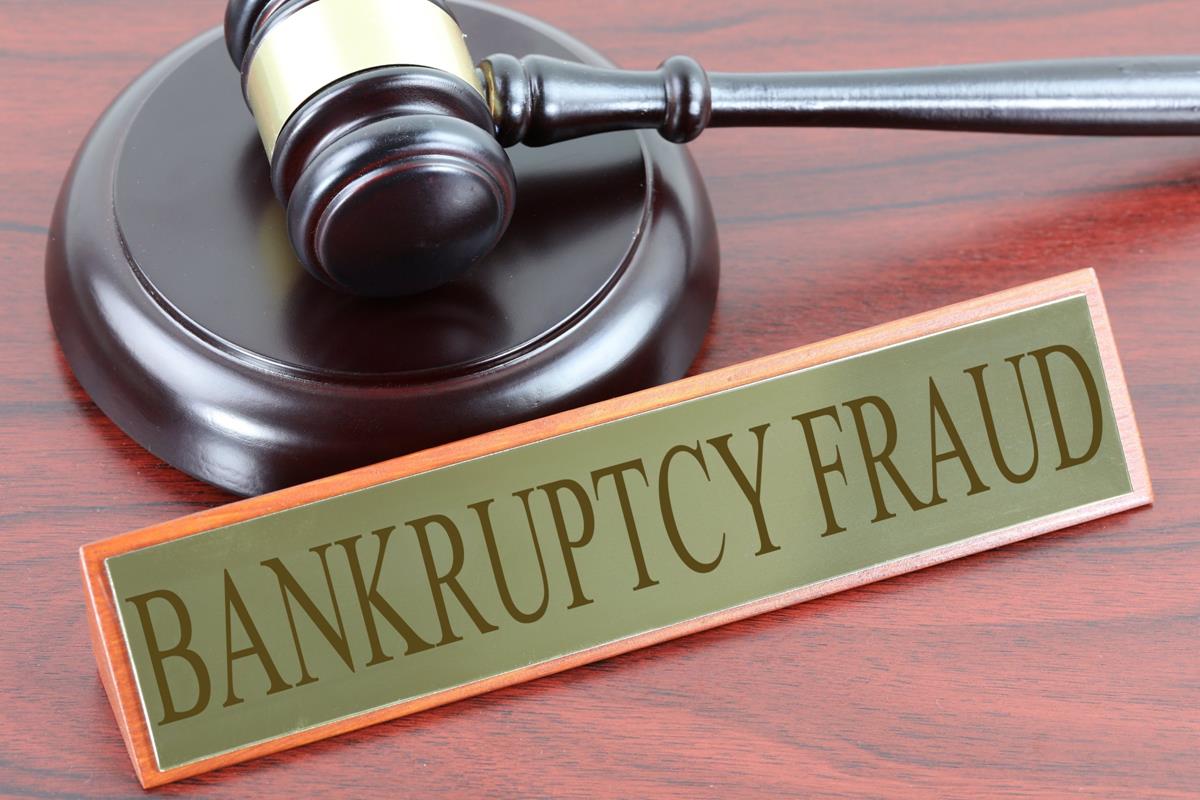What Is Bankruptcy Fraud


Written by Robert DeMarco
When you think of bankruptcy, what comes to mind? Most people would say it is a last resort – an option of last hope for those with insurmountable debts. However, some people choose to file for bankruptcy fraudulently, knowing they don’t meet the requirements and can be subject to penalties, including jail time. This article will explore what bankruptcy fraud is, who commits it, and its consequences. Stay tuned for more!
Bankruptcy Fraud
Bankruptcy fraud is when someone lies when filing for bankruptcy. They might lie about their assets or try to get more money. This type of lie is done in 10% of all bankruptcies in the U.S. There are four ways to do this: Concealment, Petition Mills, Multiple Filing Schemes, and Bust Out Schemes.
Bankruptcy fraud is the act of falsifying information to file for bankruptcy. You can also file for bankruptcy to deceive creditors.
About 10% of all bankruptcy filings in the United States involve fraudulent claims. The most common fraud schemes include the concealment of assets and petition mills.
Types Of Bankruptcy Fraud
The most common forms of bankruptcy fraud are the concealment of assets and petition mills.
Concealment Of Assets
Individuals file nearly 70% of fraudulent bankruptcy cases through concealment of assets. This fraud is when an individual deliberately fails to list all of his assets in his bankruptcy case, knowing creditors can’t liquidate any of the help they don’t know. They also fail to list houses they own and other real estate to avoid foreclosure. Similar to business owners, they often conceal assets when declaring bankruptcy. They transfer money or property to relatives or friends so that purchases can’t be confiscated.
Petition Mills
The second most common form of bankruptcy fraud is petition mills, which account for about 16% of all fraudulent filings. This type of bankruptcy fraud occurs when individuals take advantage of the wording in the U.S. Bankruptcy Code. What they do is hire a petition preparer who uses templates to complete the required U.S. Bankruptcy Court forms for a flat fee or copy and paste information from websites or online forums so that they don’t have to spend time on the bankruptcy filing.
In a petition mill scheme, a “bankruptcy petition preparer” is compensated by a debtor primarily based on the number of bankruptcy forms prepared for a separate fee without regard to whether all schedules and statements required by law have been trained or are accurate.
Multiple Filings
The third most common type is multiple filings, accounting for about 10% of bankruptcy fraud cases. What these people do is file again and again in attempts to get cash or property that has no equity. What’s more, they sometimes hire another person to change their address, so the creditor won’t know where they are. What happens is that they file for bankruptcy to stop creditors from foreclosing on their house, and then they move without notifying the creditor. They don’t know that the law requires them to inform the creditor of their new residence, so this works against them when their old home goes into foreclosure.
Attempt To Defraud Creditors
Another type is an attempt to defraud creditors, which account for about 6% of all bankruptcy fraud cases. This means that the debtor suggests or asserts something to mislead their creditors and hinder or delay collection efforts. What they do is make false promises like getting a job when at the same time they are already aware they have no intention of finding a job. What they do is get money from their creditor before filing bankruptcy, and after receiving the money, they file bankruptcy so that the creditor won’t get their money back except for what’s allowed by law.
Bust-out Schemes
While bust-outs have been a problem for a long time, many scholars have recently classified them as bankruptcy fraud. In the past, people who participated in these types of activities were considered careless but not criminal. An individual involved in a bust-out scheme will apply for as many credit cards as possible but then default on all of them. After maximizing the available credit accounts, the debtor will file bankruptcy with no intention to repay the goods. These activities often involve purchasing luxury items that creditors cannot claim during bankruptcy proceedings.
Debt Relief in Bankruptcy By Exchanging Property with Creditors
Although bankruptcy provides powerful relief from your overwhelming debts, it can also be costly to your creditors. In bankruptcy law, creditors can receive a portion of their non-essential assets to eliminate their debt. You can keep things generally necessary to maintain a home and job. You will have to disclose any property that you own or asset transfers.
Here’s what happens to the rest.
Chapter 7 bankruptcy is a process in which the bankruptcy trustee, a court-appointed official responsible for overseeing your case, sells any non-exempt property and divides the proceeds among your creditors.
In Chapter 13 bankruptcy, the trustee does not sell the property. Instead, the trustee will pay the creditors the property’s fair market value through a three to five-year repayment program.
Your creditors have the right to specific property and payments. It’s part of your deal. Bankruptcy fraud could include:
- Hiding assets.
- Intentionally omitting information on bankruptcy paperwork.
- Inappropriately using bankruptcy to the disadvantage of a creditor.
Bankruptcy Fraud Must Be Deliberate.
If it is believed that you have knowingly or intentionally committed fraud, you will only be in trouble. Why? Bankruptcy fraud is not an accident. Incorrectly reporting your income or expenses or forgetting to list assets would not increase the likelihood of bankruptcy fraud. Suppose you fail to list your vacation property in bankruptcy paperwork, hoping the trustee won’t discover it. In that case, you may have knowingly and purposely done the following: concealed an asset, filed false forms, and perjury.
Civil & Criminal Bankruptcy Fraud
Fraud is not all the same. There are significant differences in the severity of criminal and civil fraud. Find out more about the differences in these types of bankruptcy fraud.
Civil Bankruptcy Fraud
A creditor files a lawsuit (or adjudicatory proceeding) to allege wrongdoing about a particular debt. (See “Fraud That Begins Before Bankruptcy” for examples of common allegations). The creditor will prove its case, and the filer can face many consequences. The court may do any one of the following:
- Reject the claim and forbid another filing during that period
- Deny the discharge of the debt (the creditor is still responsible for it)
- Other sanctions may be imposed.
Presumptive fraud in bankruptcy is a trap that’s easy for creditors to fall into and easy for them to prove. Find out what happens if the bankruptcy trustee suspects fraud.
Criminal Bankruptcy Fraud
While most of the offenses are committed by the debtor (the person who files the claim), creditors, bankruptcy trustees, and court personnel can be convicted of bankruptcy crimes. It is more likely that a significant scheme to take multiple creditors away would lead to criminal bankruptcy fraud. Federal law requires that criminal fraud cases are investigated by the Federal Bureau of Investigation (F.B.I.). The U.S. The Department of Justice will aggressively prosecute the case.
Many types of dishonesty can be involved in criminal bankruptcy fraud. Federal criminal statutes contain the majority of bankruptcy crimes. Some of these crimes are also included.
To Avoid Bankruptcy Fraud–Consult DeMarco Mitchell, PLLC in Plano, TX
Bankruptcy fraud is a severe offense and can lead to severe consequences such as jail time, fines, and restitution. If you are charged with bankruptcy fraud in Plano or Dallas County, contact DeMarco Mitchell PLLC right away for help from an experienced Business Bankruptcy Lawyer who has the know-how to get your case dismissed before it goes too far. We will explain what types of actions constitute bankruptcy fraud and help. Call us at (972) 578-1400 to discuss your case confidentially with a Texas bankruptcy fraud lawyer.
Related Articles
Related
Chapter 7 Attorney: A Guide to Navigating Bankruptcy and Choosing the Right Legal Representation
Chapter 7 Attorney: A Guide to Navigating Bankruptcy and Choosing the Right Legal Representation Are you considering filing for Chapter 7 bankruptcy? Navigating through the complexities of bankruptcy law can be overwhelming, but with the help of a knowledgeable...
Navigating Chapter 7 Bankruptcy in Texas: Key Roles of a Texas Bankruptcy Lawyer and When to Consult One
Navigating Chapter 7 Bankruptcy in Texas: Key Roles of a Texas Bankruptcy Lawyer and When to Consult One Are you grappling with overwhelming debts and contemplating bankruptcy as a possible way out? Are you unsure about the proceedings and when to take that pivotal...
Understanding the Different Types of Bankruptcy for Individuals in Texas
Understanding the Different Types of Bankruptcy for Individuals in Texas If you're struggling with debt and considering bankruptcy as a solution, it's essential to understand the different types of bankruptcy available for individuals in Texas. At DeMarco Mitchell,...


